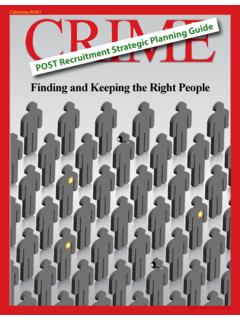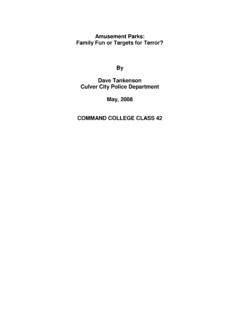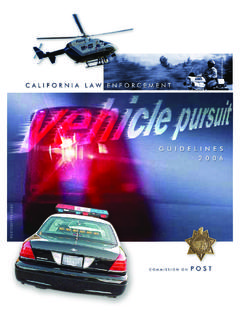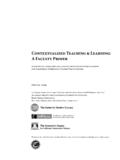Transcription of The Challenge of Ethics in Law Enforcement in the …
1 1 The Challenge of Ethics in Law Enforcement in the Face of Advancing technology Ethics in Policework in the 21st Century by Lieutenant Chuck Wilmot Orange County Sheriff s Department May 2010 COMMAND COLLEGE CLASS 46 2 The Command College Futures Study Project is a FUTURES study of a particular emerging issue of relevance to law Enforcement . Its purpose is NOT to predict the future; rather, to project a variety of possible scenarios useful for strategic planning in anticipation of the emerging landscape facing policing organizations. This journal article was created using the futures forecasting process of Command College and its outcomes.
2 Defining the future differs from analyzing the past, because it has not yet happened. In this article, methodologies have been used to discern useful alternatives to enhance the success of planners and leaders in their response to a range of possible future environments. Managing the future means influencing it creating, constraining and adapting to emerging trends and events in a way that optimizes the opportunities and minimizes the threats of relevance to the profession. The views and conclusions expressed in the Command College Futures Project and journal article are those of the author, and are not necessarily those of the CA Commission on Peace Officer Standards and Training (POST).
3 Copyright 2008 California Commission on Peace Officer Standards and Training 3 The Challenge of Ethics in law Enforcement in the face of advancing technology Today s police officers have at their disposal a wide variety of sophisticated investigatory tools. The miniaturization of electronics, computer processing speed, wireless technology , fiber optics and the Internet have all converged into a new array of investigative resources, which police officers were only beginning to learn about ten years ago. Technological advances propelled by military missions within the theaters of war in the Middle East, coupled with the federal government s impetus to find new and more effective ways to guard against radical Islamic terrorist attacks within our own borders, have accelerated the growth and sophistication level of surveillance capability.
4 Certainly, police officers of the coming decade will be using surveillance technology and computer-aided investigation techniques that might appear startling if viewed today. As the police grapple with using, and potentially misusing, these emerging technologies, it would be difficult for a reasonable person to argue against appropriate training in the ethical use of electronically-intrusive devices. For more than three decades, California police academies have incorporated specific Ethics training into their curriculum where recruits are exposed to healthy blocks of instruction on a variety of ethical issues (Orange County Sheriff s Academy 2008).
5 The public demands and has a right to expect that police officers will make ethical choices when handling sensitive and private data. Unfortunately, today s training regimen is poorly-equipped to equip tomorrow s peace officers with the necessary skills to cope with the reality of law Enforcement in the coming technological age. Continuing Ethics training is a necessary part of policework As police managers in the 21st century, shouldn t we devote serious effort to intensify training in Ethics and technology ? Until late in the last century, the teaching of ethical issues was 4 very much like it was in Plato s day 2,500 years ago.
6 Plato walked the earth wearing sandals and a robe. Amongst other musings, he argued with his friends that they should not bribe jail guards so that he could escape and thereby save his own life (Cooper 1997). Given the state of technology at the time, he did not need to consider whether it would be wrong for his friends to use infrared cameras with telephoto lenses to surveil the guards family quarters at night. He gave no thought to the ethical implications of using the Internet to research the warden s bank account or his debt ratio. Sadly, the dispersal of today s electronic information makes it possible for even a novice to intrude and inspect the actions and records of others.
7 In law Enforcement , it is often necessary to do so in pursuit of justice. How then do we ensure those charged with that responsibility do not extend the use of the same systems for their own purpose? In a Canadian research paper entitled, Privacy Outside the Castle: Surveillance Technologies and Reasonable Expectations of Privacy in Canadian Judicial Reasoning written by Krista Boa, an analysis was done about how law Enforcement s use of newer surveillance technologies and practices is qualitatively different from what was done before; or is it a matter of law Enforcement having better tools to conduct surveillance as they always have done (Boa 2010)?
8 Already we are armchair, firsthand witnesses to events in the Iraqi war, courtesy of the military s use of satellite imagery and high-resolution cameras mounted in drone aircraft flown remotely by pilots in the United States. The military is almost always at the top of the food chain when it comes to new technology , but eventually many of the federally funded technological advancements, which the armed forces first use to fight our enemies around the globe eventually trickle down to their new use of fighting crime in the mean streets of Anytown, USA. In 2007, the Houston, Texas Police Department tested a military unmanned aerial vehicle over a rural area (Dean 2007).
9 The event, attended by the United States Department of 5 Homeland Security and dozens of officers from other law Enforcement agencies, was not intended to be publicized, but was discovered by local news reporters. The test raised consternation in the Houston area. South Texas College of Law Professor Rocky Rhodes commented to the reporters that One issue is going to be law Enforcement using this and when, by using these drones, are they conducting a search in which they d need probable cause or a warrant. If the drones are being used to get into private spaces and be able to view where the government cannot otherwise go, and to collect information that would not otherwise be able to collect, that s concerning to me (Dean 2007).
10 Of course, lapses in ethical behavior are nothing new in police work. In 1980, the City of Miami, Florida mandated the hire of two hundred new minority police officers. (Delattre 2006). Background investigations revealed that many of these new recruits were unsuited to be police officers in the first place, and academy instructors also gave warnings. Although police management was forced by the City to hire new recruits whom they already believed to be undesirable, the poor training they condoned, inadequate supervision they provided, and an ineffective Internal Affairs Division caused many of the new officers to behave with contempt for the law.

















